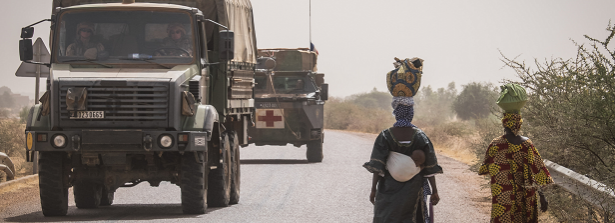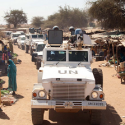Conflict Sensitivity in Food Security Programming. How to “do good” in fragile settings?

The Broker, supported by the Food & Business Knowledge Platform (F&BKP), has recently started an explorative study on conflict sensitivity of Dutch Food and Nutrition Security (FNS) policies. Mali, Burundi and Ethiopia have been chosen as case countries. Recognizing the context specificity of FNS programmes and the uncertain and ambiguous relationship with conflict and stability, The Broker aims to identify what is already being done, formulate a checklist for “asking the right questions” and deepen the debate on conflict sensitive approaches in FNS programming.
In recent years conflict prevention and the promotion of economic and political stability have become a top priority in political debates and increasingly in all fields of development policy. At first glance, ensuring that development policies “do no harm” and preferably “do good” seems like an obvious goal. Achieving this however, requires more than good intentions, a solid programme design and capable implementing parties. As programmes are located in various areas, each with their specific complexities, dynamics and – as is often the case with development programmes – conflicts, “doing no harm” requires a thorough understanding of the surrounding contexts and the ways in which programmes interact with and impact upon them.
Against this backdrop, The Broker supported by the F&BKP, has initiated a new trajectory which focuses on conflict sensitivity of FNS policies and programmes managed by Dutch embassies. It consists of a quick scan of the three focus countries, the composition of a checklist on conflict sensitivity and two meetings with policymakers, researchers and practitioners to validate and build upon the findings. At present, Dutch FNS policies do address instability and conflict indirectly, but it is not an official component of policy as such. By looking at three case countries – Mali, Burundi and Ethiopia – a quick scan seeks to determine to what extent conflict sensitive approaches are finding their way into FNS programming via more ‘informal’ or ‘implicit’ routes. Policymakers, embassy staff and those working at the implementation-end of FNS programmes share a wealth of knowledge and experience among them with regards to the dynamics of conflict and instability in their respective regions. Inevitably this “tacit” knowledge results in them operating with some level of conflict sensitivity, even though this is not necessarily documented, systematized or part of official strategy. By doing interviews with representatives from the embassies and a selection of programmes, The Broker hopes to bring this tacit knowledge and the daily practice of conflict sensitivity in FNS programmes to the surface and draw lessons from what is already being done in the three case countries.
As the relationship between food security and stability is far from clear, The Broker and the F&BKP are not aiming to formulate conclusive recommendations about how FNS policies could be amended to contribute to conflict prevention. Rather, this trajectory should be seen as an effort to further the debate on conflict sensitive approaches in FNS policies and provide policymakers with a practical tool for “asking the right questions” when thinking about designing, implementing and evaluating FNS programmes. To achieve these modest goals, this trajectory consists of several phases which result in different knowledge products, including reports and meetings. Finally, to ensure that the approach and method in each phase is appropriate and relevant – especially in relation to the focus of the new Dutch government – The Broker frequently consults a Reference Group that was formed specifically for this purpose, consisting of representatives from the Ministry of Foreign Affairs, universities and the Knowledge Platforms INCLUDE and KPSRL.






